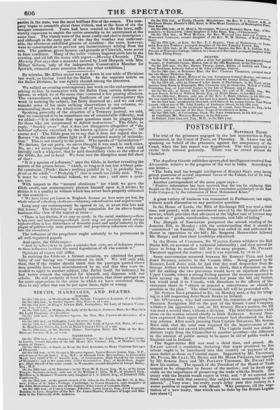We rallied an evening contemporary last week on the embarrassments
arising to him in connexion with the Ballot from certain delicate re- lations, to which we at the same time ventured a few passing allusions. The extraordinary and engaging frankness of our contemporary this week in noticing the subject, has fairly disarmed us ; and we can only transfer some of his more striking observations to our columns, re- commending them to the admiration of all lovers of candour.
Speaking generally of the situation of a Treasury journal, we said, that we conceived it to be sometimes one of considerable difficulty, and we added—" It is obvious that open questions must be plaguy things for those who are accustomed to definite instructions." The Globe, in reply, "frankly owns" that it does not disapprove altogether of "the habitual influence exercised by the known opinions of a superior." Of course not ! The Globe goes on to say that it does not regard this in- fluence "in the same odious light as if it consisted merely of intimida- tion." This is not exactly to the point. Who speaks of" intimidation?" We declare, for our parts, we never thought it was used in such cases. No, no ; we never imagined that the " Whipper-in " was really and literally such a whipster, that he paid domiciliary visits to the editor of the Globe, &c. rod in hand. We were sure the discipline must fall short of that!
"It is a species of influence," says the Globe, in further revealing the secrets of the prison-house, "which, so long as it can last without pain- ful constraint, [Pooh ! there's nothing painful in it,] is probably bene- ficial on the whole."—" Probably!" that is much too coldly said. Why, it must be very beneficial indeed, we are sure ; and once a quar- ter, too.
With respect to the "natural obedience" for which we gave the Globe credit, our contemporary plumes himself upon it, it seems ; he thinks it is a quality in writers which has never been properly estimated in this country-
" We have never yet learnt in England, because we have never yet lost, the whole value of voluntary obedience—voluntary subordination and acquiescence."
Long may our contemporary be spared to us, to avert this loss and this lesson ! The following is equally admirable for its above-board, business-like view of the matter at issue- " There is less friction, if we may so speak, in the social machinery—there is less envy and heartburniim—though merit may not precisely stand always highest—there is less disturbsance of domestic peace and useful industry by the plague of politics—the more permanent and proprietary influences can main- tain the ascendancy."
The influence of the proprietor ought certainly to be paramount in all well-regulated papers.
And again, the Globe says—
Anti we believe it to be quite a mistake that every act of deference shown to these influences involves the moral degradation of all who concede it."
Opinions of course will differ. In noticing the Globe on a former occasion, we admitted the possi- bility of our having not " understood its drift." We will only add, then, that if the reader should think that the passages quoted above may possibly have been misunderstood by us, and that they were in- tended to apply to another subject, (the Ballot itself, for instance,) he had better consult the original for himself, and dispense with our scholia. He will probably at least be of opinion, that those passages are far more appiropriate in the sense in which we have construed them, than in any other that can be put upon them, right or wrong.


























 Previous page
Previous page